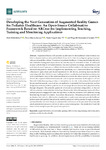| dc.contributor.author | Vidal-Balea, Aida | |
| dc.contributor.author | Blanco, Óscar | |
| dc.contributor.author | Fraga-Lamas, Paula | |
| dc.contributor.author | Fernández-Caramés, Tiago M. | |
| dc.date.accessioned | 2021-04-13T14:55:02Z | |
| dc.date.available | 2021-04-13T14:55:02Z | |
| dc.date.issued | 2021-03-07 | |
| dc.identifier.citation | Vidal-Balea, A.; Blanco-Novoa, Ó.; Fraga-Lamas, P.; Fernández-Caramés, T.M. Developing the Next Generation of Augmented Reality Games for Pediatric Healthcare: An Open-Source Collaborative Framework Based on ARCore for Implementing Teaching, Training and Monitoring Applications. Sensors 2021, 21, 1865. https://doi.org/10.3390/s21051865 | es_ES |
| dc.identifier.issn | 1424-8220 | |
| dc.identifier.uri | http://hdl.handle.net/2183/27736 | |
| dc.description.abstract | [Abstract]
Augmented Reality (AR) provides an alternative to the traditional forms of interaction between humans and machines, and facilitates the access to certain technologies to groups of people with special needs like children. For instance, in pediatric healthcare, it is important to help children to feel comfortable during medical procedures and tests that may be performed on them. To tackle such an issue with the help of AR-based solutions, this article presents the design, implementation and evaluation of a novel open-source collaborative framework that enables to develop teaching, training, and monitoring pediatric healthcare applications. Specifically, such a framework allows for building collaborative applications and shared experiences for AR devices, providing functionalities for connecting with other AR devices and enabling real-time visualization and simultaneous interaction with virtual objects. Since all the communications involved in AR interactions are handled by AR devices, the proposed collaborative framework is able to operate autonomously through a Local Area Network (LAN), thus requiring no cloud or external servers. In order to demonstrate the potential of the proposed framework, a practical use case application is presented. Such an application has been designed to motivate pediatric patients and to encourage them to increase their physical activity through AR games. The presented games do not require any previous configuration, as they use ARCore automatic surface detection technology. Moreover, the AR mobile gaming framework allows multiple players to engage in the same AR experience, so children can interact and collaborate among them sharing the same AR content. In addition, the proposed AR system provides a remote web application that is able to collect and to visualize data on patient use, aiming to provide healthcare professionals with qualified data about the mobility and mood of their patients through an intuitive and user-friendly web tool. Finally, to determine the performance of the proposed AR system, this article presents its evaluation in terms of latency and processing time. The results show that both times are low enough to provide a good user experience. | es_ES |
| dc.description.sponsorship | This work has been funded by the Xunta de Galicia (by grant ED431C 2020/15, and grant ED431G 2019/01 to support the Centro de Investigación de Galicia “CITIC”), the Agencia Estatal de Investigación of Spain (by grants RED2018-102668-T and PID2019-104958RB-C42) and ERDF funds of the EU (FEDER Galicia 2014-2020 & AEI/FEDER Programs, UE) | es_ES |
| dc.description.sponsorship | Xunta de Galicia; ED431C 2020/15 | es_ES |
| dc.description.sponsorship | Xunta de Galicia; ED431G 2019/01 | es_ES |
| dc.language.iso | eng | es_ES |
| dc.publisher | MDPI AG | es_ES |
| dc.relation | info:eu-repo/grantAgreement/AEI/Plan Estatal de Investigación Científica y Técnica y de Innovación 2017-2020/RED2018-102668-T/ES/RED COMONSENS | |
| dc.relation | info:eu-repo/grantAgreement/AEI/Plan Estatal de Investigación Científica y Técnica y de Innovación 2017-2020/PID2019-104958RB-C42/ES/AVANCES EN CODIFICACION Y PROCESADO DE SEÑAL PARA LA SOCIEDAD DIGITAL | |
| dc.relation | info:eu-repo/grantAgreement/AEI/Plan Estatal de Investigación Científica y Técnica y de Innovación 2017-2020/PID2019-104958RB-C42/ES/AVANCES EN CODIFICACION Y PROCESADO DE SEÑAL PARA LA SOCIEDAD DIGITAL | |
| dc.relation | info:eu-repo/grantAgreement/AEI/Plan Estatal de Investigación Científica y Técnica y de Innovación 2017-2020/RED2018-102668-T/ES/RED COMONSENS | |
| dc.relation.uri | https://doi.org/10.3390/s21051865 | es_ES |
| dc.rights | Atribución 4.0 Internacional (CC BY 4.0) | es_ES |
| dc.rights.uri | https://creativecommons.org/licenses/by/4.0/ | * |
| dc.subject | Augmented reality | es_ES |
| dc.subject | Mixed reality | es_ES |
| dc.subject | Gaming | es_ES |
| dc.subject | ARCore | es_ES |
| dc.subject | Teaching | es_ES |
| dc.subject | Training | es_ES |
| dc.subject | Online education | es_ES |
| dc.subject | Pediatric | es_ES |
| dc.subject | Mobile health | es_ES |
| dc.subject | eHealth | es_ES |
| dc.title | Developing the Next Generation of Augmented Reality Games for Pediatric Healthcare: An Open-Source Collaborative Framework Based on ARCore for Implementing Teaching, Training and Monitoring Applications | es_ES |
| dc.type | info:eu-repo/semantics/article | es_ES |
| dc.rights.access | info:eu-repo/semantics/openAccess | es_ES |
| UDC.journalTitle | Sensors | es_ES |
| UDC.volume | 21 | es_ES |
| UDC.issue | 5 | es_ES |
| UDC.startPage | 2021 | es_ES |
| dc.identifier.doi | 10.3390/s21051865 | |






